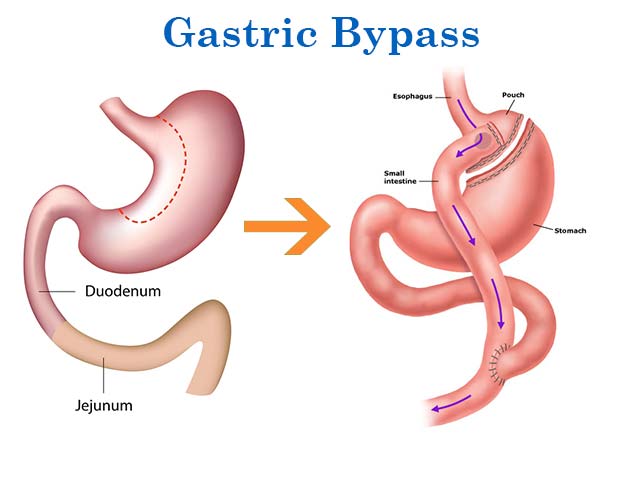What is Roux-en-Y Gastric Bypass and why is it Performed?
Roux-en-Y gastric bypass (RYGB) is a weight loss surgery that reduces the size of the stomach and is the most common type of gastric bypass surgery in the United States. Bariatric surgeons at the Dr. Mousavi Hospital Weight Center perform gastric bypass as a minimally invasive procedure or a standard procedure, depending on the needs of the patient.

RYGB is recommended for patients based on the following benefits:
- The average loss of 45% to 85% of excess weight
- Causes increased fullness, decreased hunger
- Improves conditions such as type 2 diabetes, gastroesophageal reflux disease (GERD), and hypertension
- Increased life expectancy
- Positive effects on insulin resistance
To qualify for this procedure, patients must have a Body Mass Index (BMI) of 40 or greater, or a BMI of 35 or greater plus a medical condition such as type 2 diabetes, high blood pressure, or sleep apnea. Patients must also have tried other weight loss approaches that did not lead to significant and sustainable weight loss.
How is Gastric Bypass Performed?
During gastric bypass surgery, a surgeon creates a small gastric pouch from the top of the stomach. This pouch is approximately two tablespoons in volume, therefore limiting the patient’s food intake.
During the procedure, the small intestine is divided into two “limbs”: the biliopancreatic limb and the Roux limb. The biliopancreatic limb, also known as the duodenum, is located at the beginning of the small intestine. This limb contains digestive juices from the stomach, bile, and pancreas. The Roux limb, the middle portion of the small intestine also known as the jejunum, is connected to the pouch. Food flows directly from the pouch into the Roux limb, bypassing most of the stomach. The remaining stomach continues to produce digestive juices that flow into the biliopancreatic limb, which is re-attached below the Roux limb. The intersection of these limbs forms a "Y."
At Dr. Mousavi's hospital, gastric bypass surgery is usually performed laparoscopically with a few small incisions. Surgeons use narrow cylindrical tubes called trocars to access the abdominal cavity through small incisions in the upper abdominal wall. The duration of this procedure varies between an hour and a half to four hours.
After the procedure, you will stay at the hospital for one or two nights. We recommend taking off three to four weeks from work.
What preparation is required before Surgery?
You may need to sign up for a pre-surgical nutrition plan before doing so. All patients scheduled for weight loss surgery are required to reduce their weight before surgery. Weight loss before obesity surgery results in a decrease in liver size, commonly known as a liver shrinkage diet. This reduction in the size of the liver facilitates surgery and accelerates the duration of surgery and reduces postoperative complications. Your nutritionist will develop a diet plan specifically tailored to your weight loss.
What Happens After the surgery is performed?
At Dr. Mousavi Hospital, the care team develops a personalized postoperative plan to monitor, guide, and support you after the operation. The program is divided into two stages: postoperative care (adjustment) postoperative and lifestyle modification - each lasting three months.
How safe is the Procedure?
Dr. Mousavi's hospital care team will talk to you about the benefits and risks of this method and give you the information you need. Among the complications of this procedure:
- Bleeding
- Dehydration
- Dumping, where food and digestive juices from your stomach move to your small intestine in an uncontrolled, abnormally fast manner. Symptoms include dehydration, sweating, and rapid heartbeat. Foods high in carbohydrates lead to this complication
- Internal hernias, which occur in 2% to 4% of patients, could lead to obstruction, where the intestines malfunction, preventing the normal digestive process
- Revisional surgery, if perforation of the pouch occurs
- Ulcers in the pouch occur in 2% to 7% of patients
Dr. Mousavi Hospital with a professional team and a long history of operation supports you in all circumstances.